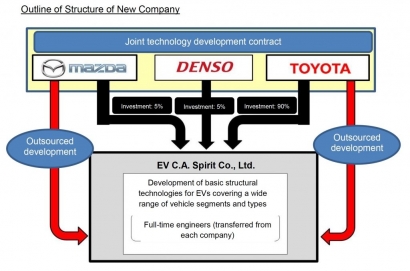
As increasingly stringent policies to help reduce greenhouse gases are enacted around the world, new regulations mandating a certain proportion of electric vehicle sales are beginning to emerge. Complying with these environmental regulations while at the same time ensuring the sustainable growth of these companies requires development of a wide range of powertrains and technologies. Electric vehicles (EVs) are regarded by the three as a key technological field in this process alongside fuel cell vehicles.
Mazda, Denso, and Toyota have decided to jointly develop basic structural technologies for EVs capable of covering a wide variety of vehicle segments and types to ensure flexible and rapid response to market trends.
This agreement covers a diverse range of models, from minivehicles to passenger vehicles, SUVs, and light trucks, and aims to innovate the development process by combining the strengths of each company, including Mazda's bundled product planning and prowess in computer modeling-based development, Denso’s electronics technologies, and the Toyota New Global Architecture (TNGA) platform.
The companies also aim to create a business structure that is open to participation by other automakers and suppliers.
Illustration: Courtesy of Denso

